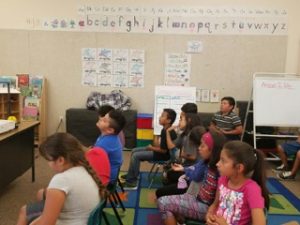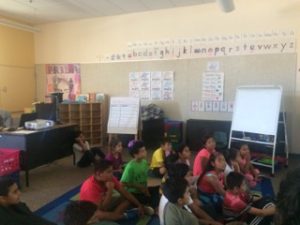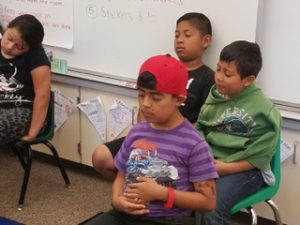“If every 8 years old in the world taught meditation we will eliminate violence from the world within one generation”
His Holiness The Dalia Lama
When you bring mindfulness to schools and teach students the practice of mindfulness meditation, teach them how to connect with their breath and stay with it, how to manage their emotions when they are angry, sad or frustrated, acknowledge the feeling, learn to stay calm and act mindfully, you feel joy and satisfaction beyond words.
It is wonderful and very rewarding, yet sometimes it becomes a bit challenging to keep them calm and quiet during the session.
When you tell them to sit still and bring the mindful body up (mindful body means quiet, yet alert body) they look at you like this is the first time they have heard this sentence! What does that mean to be totally quiet? How am I going to sit still, don’t move for a minute? Focusing on my breath is so boring…….

Then when you explain to them what is mindfulness and what benefits it will bring, they start looking and you strangely and asking with their beautiful eyes: Is it really possible to stay calm when my friend makes me angry or annoyed?
In another word, it is possible to respond wisely instead of reacting blindly when we get upset, angry or nervous?
I have been practising meditation for over 30 years and teaching meditation for many years now. Therefore with all experiences I have with myself and all other people I have met, practised with them or taught them this profound practice, I can certainly tell you: YES it is possible to manage your anger, frustration, stress and all other strong emotions, and respond mindfully to any given situation.

Kids love my singing bowl, and they love to share their experiences about mindful listening, mindful breathing….., and how they are able to manage their emotions and back to their breathing when someone makes them angry or annoyed. They have acknowledged, they can stay calm now that they learn mindfulness! They love to take a turn and ring the bell to end each mindfulness session and be part of this movement!
Imagine if we teach children from age 5 or 6 to practice mindfulness and become aware of their thoughts, emotions and behaviors moment by moment, take responsibility for their actions, understanding that their actions affect other people around them, keep them accountable from that age, and help them understand who they really are, we will see a great impact in our community, society and eventually in our world.
When we teach students mindfulness curriculum, we teach them how to sit with a mindful body, practice mindful listening, loving-kindness meditation, body scan, gratitude, generosity, empathy, mindful eating, managing their stress at the time of the exam, and overall being mindful of every activity.
Consequently, they will become self-aware and can improve their social and emotional skills. It will bring a sense of responsibility to them that every action matters. They become responsible for their own behaviours and learn how to respond mindfully to others.
Gita Nilforoush
Contact us today to book your free online meditation session: info@meditationforallages.com


